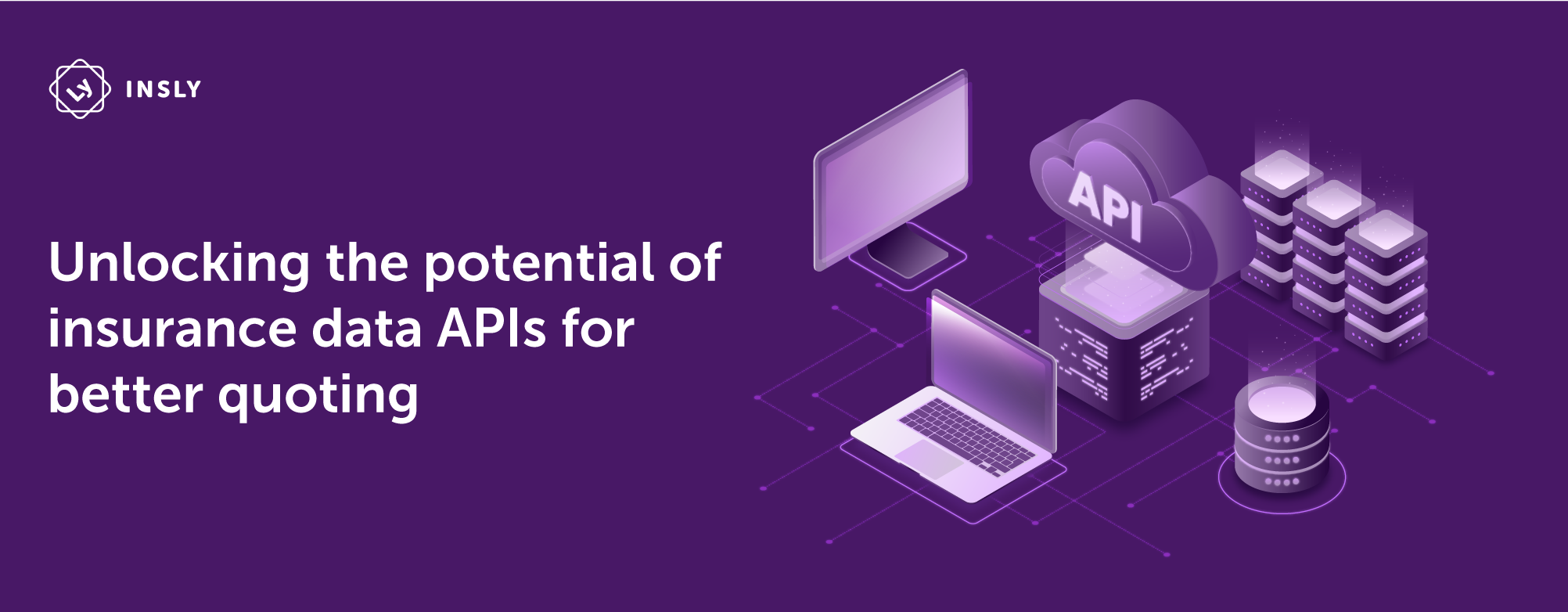Application Programming Interfaces (APIs) are revolutionizing the insurance industry by enabling seamless data exchange and integration between systems. For insurers and MGAs looking to streamline their quoting processes and enhance customer experiences, leveraging insurance data APIs offers tremendous potential. This article explores how APIs are being utilized within insurance to improve quoting accuracy, efficiency, and personalization.
The Growing Importance of APIs in Insurance
APIs have become essential tools for modernizing insurance operations and keeping pace with customer expectations in the digital age. Some key reasons APIs are gaining traction include:
- Enabling real-time data access and exchange between systems
- Facilitating integration of third-party data sources
- Supporting omnichannel distribution and self-service capabilities
- Allowing insurers to quickly launch new digital products and services
- Improving operational efficiency through automation
The adoption of APIs in the insurance industry represents a paradigm shift in how insurers operate and interact with their customers. APIs are not just a technological advancement; they are a strategic imperative for insurers looking to remain competitive in an increasingly digital marketplace. By leveraging APIs, insurers can break down data silos, foster innovation, and create more agile and responsive business models.
Moreover, APIs are enabling insurers to participate in broader ecosystems and partnerships, opening up new revenue streams and distribution channels. For example, insurers can integrate their products into third-party platforms, such as e-commerce sites or travel booking portals, reaching customers at the point of need. This level of integration and flexibility was simply not possible before the widespread adoption of APIs in the insurance sector.
Enhancing Quoting with Insurance Data APIs
Here are some of the key ways insurers and MGAs are leveraging APIs to optimize their quoting processes:
Accessing Real-Time Data for Accurate Risk Assessment
APIs allow insurers to tap into external data sources in real-time to enrich their risk assessment during quoting. This may include:
- Vehicle information databases for auto insurance
- Property characteristics and claims history for homeowners insurance
- Health records and prescription data for life/health insurance
By incorporating the latest relevant data, insurers can provide more accurate and personalized quotes.
The use of real-time data through APIs represents a significant leap forward in risk assessment capabilities. Traditionally, insurers relied on historical data and broad demographic information to assess risk. Now, with APIs, they can access up-to-the-minute information about individual risks, leading to more precise underwriting decisions.
For example, in auto insurance, an API could provide real-time information about a vehicle’s current mileage, recent accidents, or even driving behavior data from telematics devices. This granular level of information allows insurers to offer more accurate quotes that truly reflect the risk profile of each individual customer, potentially leading to fairer pricing and improved loss ratios for the insurer.
Streamlining the Application Process
APIs enable insurers to pre-fill application forms with existing customer data or information from third-party sources. This reduces manual data entry, improves accuracy, and creates a faster, more convenient experience for customers.
The streamlining of the application process through APIs goes beyond mere convenience; it represents a fundamental shift in how insurers interact with their customers. By reducing the friction in the application process, insurers can significantly improve conversion rates and customer satisfaction.
Moreover, the use of APIs in this context can help insurers capture more accurate and comprehensive data about their customers. For instance, an API could pull in data from various sources to create a more complete picture of a customer’s risk profile, including credit scores, claims history from other insurers, or even lifestyle information from social media platforms (with appropriate permissions, of course).
This enhanced data collection not only improves the accuracy of quotes but also provides insurers with valuable insights for product development, marketing, and customer relationship management.
Enabling Instant Quoting
With APIs facilitating real-time data exchange, insurers can provide instant quotes through digital channels. This meets rising customer expectations for speed and convenience in the digital age.
The ability to provide instant quotes is transforming the insurance buying process. In an era where consumers are accustomed to immediate gratification in their digital interactions, the traditional weeks-long process of obtaining an insurance quote is no longer acceptable.
APIs make it possible for insurers to process complex risk calculations and provide accurate quotes in seconds. This capability is particularly powerful when combined with artificial intelligence and machine learning algorithms, which can analyze vast amounts of data to produce highly personalized quotes almost instantaneously.
Furthermore, instant quoting enables insurers to experiment with dynamic pricing strategies, adjusting quotes in real-time based on factors such as current demand, competitive landscape, or even time of day. This level of pricing flexibility was previously unthinkable in the insurance industry.
Supporting Multi-Carrier Quoting
For insurance agencies and brokers, APIs allow them to easily obtain and compare quotes from multiple carriers through a single interface. This improves efficiency and helps find the best options for clients.
The impact of APIs on multi-carrier quoting extends far beyond simple efficiency gains. By enabling easy comparison of quotes from multiple carriers, APIs are fostering greater competition in the insurance market, potentially leading to better prices and products for consumers.
Moreover, this capability is empowering insurance brokers and comparison websites to provide more value to their customers. Instead of manually reaching out to multiple carriers for quotes, these intermediaries can now offer a comprehensive view of the market at the click of a button.
This trend is also driving innovation among carriers, as they strive to differentiate their offerings in an increasingly transparent marketplace. Some insurers are developing unique API-driven features or bundled products that can set them apart in multi-carrier quoting platforms.
Personalizing Quotes
By leveraging customer data through APIs, insurers can tailor quotes based on individual risk profiles, preferences, and behaviors. This level of personalization can improve conversion rates and customer satisfaction.
The personalization of insurance quotes through APIs represents a significant shift towards customer-centricity in the insurance industry. By tapping into a wide range of data sources, insurers can create highly tailored quotes that reflect the unique circumstances of each customer.
This level of personalization goes beyond simply adjusting prices based on risk factors. APIs can enable insurers to offer customized coverage options, suggest relevant add-ons, or even create entirely bespoke insurance products based on an individual’s specific needs and preferences.
For example, a homeowner’s insurance API might pull in data about a customer’s home security system, local crime rates, and even their social media activity to create a personalized quote. It could then suggest specific coverage options based on the customer’s lifestyle, such as extra coverage for high-value jewelry for a customer who frequently posts about luxury items.
This hyper-personalization not only improves the customer experience but can also lead to better risk selection for insurers, as they gain a more comprehensive understanding of each customer’s risk profile.
Implementing an API Strategy
To effectively leverage APIs for quoting and other insurance processes, companies should:
- Identify key use cases and prioritize API development/integration
- Ensure robust security and compliance measures
- Adopt API management tools for governance and monitoring
- Foster a culture of innovation and collaboration around APIs
- Consider partnering with insurtechs and technology vendors
Insurance capacity will become a commodity; it will be accessible for MGAs and brokers the same way as Google Cloud or Amazon AWS. APIs are key enablers of this trend toward more flexible, modular insurance infrastructure.
Implementing an effective API strategy requires a holistic approach that goes beyond just technical considerations. It involves a fundamental shift in how insurers think about their business models and technology infrastructure.
Firstly, identifying key use cases is crucial. Insurers should start by mapping out their current processes and identifying areas where APIs could drive the most value. This might include customer-facing processes like quoting and claims, as well as internal processes like underwriting and policy administration.
Security and compliance cannot be overstated in importance. As APIs open up systems to external connections, robust security measures are essential to protect sensitive data and maintain regulatory compliance. This includes implementing strong authentication mechanisms, encrypting data in transit and at rest, and regularly auditing API usage.
API management tools are crucial for maintaining control over an expanding API ecosystem. These tools can help with tasks like version control, usage monitoring, and access management. They also provide valuable analytics that can inform future API development and business strategies.
Fostering a culture of innovation around APIs is perhaps one of the most challenging yet rewarding aspects of an API strategy. This involves encouraging teams across the organization to think creatively about how APIs can be used to solve problems and create new opportunities. It may also involve upskilling staff and hiring new talent with API expertise.
Finally, partnerships with insurtechs and technology vendors can accelerate API adoption and innovation. These partnerships can bring in specialized expertise, provide access to cutting-edge technologies, and help insurers stay ahead of industry trends.
The Future of Insurance Quoting
As API adoption grows, we can expect to see continued innovation in insurance quoting, including:
- More sophisticated real-time pricing models
- Expanded use of alternative data sources
- Greater automation and straight-through processing
- Improved quote personalization and tailoring
- Seamless omnichannel quoting experiences
While challenges around data standardization and legacy system integration remain, APIs are poised to play an increasingly vital role in transforming insurance quoting and distribution.
The future of insurance quoting is set to be dramatically different from what we see today, largely driven by the capabilities enabled by APIs. One of the most significant changes we’re likely to see is the development of increasingly sophisticated real-time pricing models. These models will be able to incorporate a vast array of data points, from traditional risk factors to real-time behavioral data, to produce highly accurate and dynamic quotes.
The use of alternative data sources is also set to expand significantly. APIs will enable insurers to tap into unconventional data sources such as social media activity, IoT device data, or even satellite imagery. This wealth of data will allow for more nuanced risk assessment and could potentially open up new markets for insurance products.
Automation and straight-through processing will become the norm rather than the exception. As APIs enable seamless integration between systems, many parts of the quoting process that currently require human intervention will become fully automated. This will not only improve efficiency but also reduce errors and allow for 24/7 quoting capabilities.
Quote personalization will reach new heights. APIs will enable insurers to create highly tailored quotes that take into account not just risk factors, but also customer preferences, lifestyle choices, and even predictive models of future behavior. This level of personalization could transform the customer experience and significantly improve conversion rates.
Finally, we can expect to see truly seamless omnichannel quoting experiences. Whether a customer starts a quote on their mobile phone, continues on their laptop, and finishes with a call to an agent, APIs will enable a consistent and continuous experience across all channels.
By embracing APIs and the opportunities they enable, forward-thinking insurers and MGAs can gain a competitive edge through faster, more accurate, and more customer-centric quoting capabilities. The future of insurance is digital, data-driven, and API-powered.



